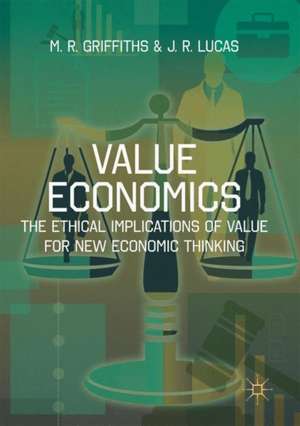Value Economics: The Ethical Implications of Value for New Economic Thinking
Autor M. R. Griffiths, J. R. Lucasen Limba Engleză Paperback – 14 ian 2019
Preț: 201.06 lei
Nou
Puncte Express: 302
Preț estimativ în valută:
38.48€ • 41.82$ • 32.35£
38.48€ • 41.82$ • 32.35£
Carte tipărită la comandă
Livrare economică 21 aprilie-05 mai
Preluare comenzi: 021 569.72.76
Specificații
ISBN-13: 9781349958986
ISBN-10: 1349958980
Pagini: 281
Ilustrații: XV, 281 p.
Dimensiuni: 148 x 210 mm
Greutate: 0.36 kg
Ediția:1st ed. 2016
Editura: Palgrave Macmillan UK
Colecția Palgrave Macmillan
Locul publicării:London, United Kingdom
ISBN-10: 1349958980
Pagini: 281
Ilustrații: XV, 281 p.
Dimensiuni: 148 x 210 mm
Greutate: 0.36 kg
Ediția:1st ed. 2016
Editura: Palgrave Macmillan UK
Colecția Palgrave Macmillan
Locul publicării:London, United Kingdom
Cuprins
1. Economics as a Moral Science.- 2. Cooperation and Facilitation.- 3. Money as 'Encapsulated Choice'.- 4. The Moneyed Society.- 5. Boom or Bust.- 6. Work and Employment.- 7. Economic Value and Intrinsic Value.- 8. Relating Economic Value to Executive Compensation.- 9. Regulation and Control of Economic Value.- 10. Corporate Social Responsibility and Business Ethics.- 11. Philosophy of Economics and Business Ethics.- 12. New Economic Thinking and Economic Justice.
Notă biografică
M. R. Griffiths was Managing Partner for Italy at the actuarial consulting firm, Towers Perrin (now Towers Watson), until retiring in 2003, and is now a non-executive director of two Italian insurance companies in Milan, Italy. He was previously President of the British Chamber of Commerce for Italy where he has lived for thirty years.
J. R. Lucas is a Fellow and Former Tutor of Merton College, Oxford, and previously a Fellow of Corpus Christi College, Cambridge. He is a former President of the British Society for the Philosophy of Science, and his publications include Democracy and Participation (1976), On Justice (1980) and Responsibility (1993).
Textul de pe ultima copertă
The last financial crisis revealed a gap between business practice and ethics. In Value Economics, Griffiths and Lucas examine some of the reasons for this ethical gap and discuss the resulting loss of confidence in the financial system. One of the reasons has been hazy or inadequate thinking about how we value economic enterprises. With the close link between the creation of value and business ethics in mind, this book proposes that economic value should become the basic metric for evaluating performance in the creation of value, and for establishing fair and reasonable standards for executive compensation. Value Economics considers a number of rational philosophical principles for business management, on which practical codes of business ethics can be based. As the creation of value has moral implications for economic justice, the book reaffirms the argument for economics as a moral science, and seeks, within the context of proposed changes in the regulation and control of financial services, to answer the following question: will things really change after the last financial crisis?
Caracteristici
Reaffirms the argument for economics as a moral science, and seeks, within the context of proposed changes in the regulation and control of financial services Examines some of the reasons for this ethical gap and discuss the resulting loss of confidence in the financial system Proposes that economic value should become the basic metric for evaluating performance in the creation of value, and for establishing fair and reasonable standards for executive compensation
